Murphy’s Law: INXS manager on ‘band to brand’ and the music industry in 2019
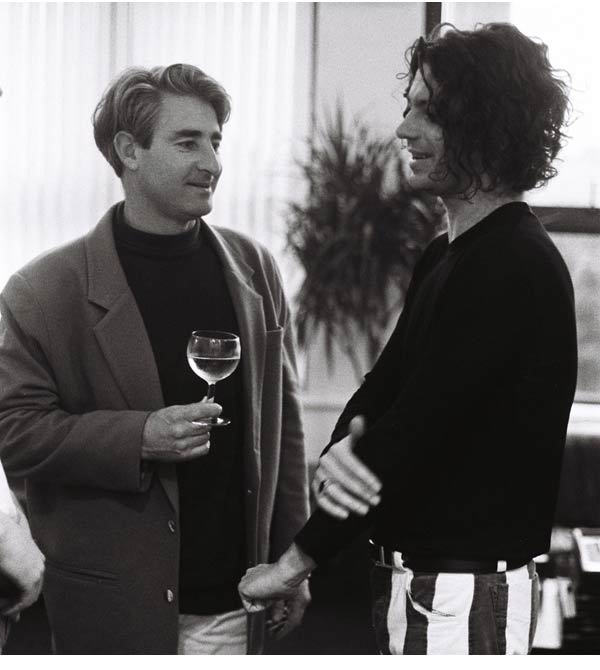
Chris Murphy managed INXS from 1979-1995 before returning in 2009 with a self-proclaimed desire to re-energise the interest in the group by turning the band into a brand.
2017 saw the acclaimed Kick 30 reissue – featuring a Dolby Atmos surround mix by Giles Martin – hit the shops and this year has seen the release of Mystify: A Musical Journey With Michael Hutchence (a wonderful companion to the Mystify documentary) and a restored version of the Live Baby Live concert film which is receiving a theatrical run in the UK at the moment. The newly remixed soundtrack is out today.
We caught up with the Australian music entrepreneur in the summer to discuss these projects and found a very driven individual and a canny operator and someone candid about what he does and doesn’t like about the music industry. “I’m not here to make money in life, I love doing the things I’m passionate about,” he tells SDE…
SuperDeluxeEdition: The 4K restoration of ‘Live Baby Live’ is incredible. The thing that came across more than anything was just how amazing Michael was as a frontman.
Chris Murphy: For 21 years people talked about Michael’s death and girls and drugs and bullshit and fucking money and this and that. And very few people have spoken about his lyrics… the fact that he’s a poet, and a beautiful guy and what an extraordinary frontman.
And even to me, who managed the dude for 15 years and now have been working on putting INXS back together again for nine years. Shit, that’s 24 years of my life. Even I sat there last night [at a special screening of Live Baby Live] thinking how does Michael’s voice hold out. He’s really pushing… I grew up in it in the entertainment business and I’ve been around singers all my life, with my parents having a theatrical agency. So I know a lot about vocals and so forth, and I was watching him last night, he’s just pushing his vocals. I mean he’s excited, the adrenaline, it was heavy-duty, which you could see close up. That was the other thing I could see last night, is the adrenaline of the band and where the adrenaline, where the exhaustion started to take over the adrenaline, and then where the audience kicked back in again and the audience then lifted them up to take them home to the second part of the show. And I thought my God, Michael’s just … that voice of his, it’s just extraordinary.
By the way… I want to thank you for your review of Mystify, A Musical Journey with Michael. You got the whole thing straightaway, so you got everything and you’re one of the first in the world, so really, really appreciate that. I do. When I got that I was, you know, I risked my reputation and partly my career on that album, so it must be ’cause I’m a brave bastard.
SDE: When I wrote that I’d listened to half of it but I’ve now listened to the whole thing a few times. The whole ‘Musical Journey’ is actually a really great title for it because it does take you on a journey and it has that dreamlike thing where it just transports you. And that’s what’s so good about it.
CM: I’ve had to deal with a lot of questions and a lot of crap around, “oh, this is not the soundtrack.” The Mystify film went off on its own tangent with a very arrogant attitude towards INXS and Universal [Music]. You know… we’ll do whatever we’re going to do and we’re going to do this and we’re going to do that. And we don’t care about your music…
SDE: Just to take the story from the beginning, tell me a little bit about your relationship with [director] Richard Lowenstein. Because you’re obviously both massive champions of INXS, but it seems like you’re maybe slightly pulling in different directions with regards to the documentary…
CM: Richard has taken … Let’s put this into perspective. As I said, initially they didn’t believe they needed INXS’s music, it was sort of a little bit of a secondary thing, because the film was going to be so great. So we went, okay, fine.
SDE: So they were going to do the film without any INXS music in it, is that what you’re saying?
CM: Yeah, that was their approach, it was a bit carefree. Now, there was also outstanding legal issues, I must point out, that there were some issues around use of INXS’ archives that were going to be used in the film without INXS’ approval. And both myself and Universal were like “listen dudes, there’s things in the world called rights and assets and responsibilities, so we need to get all that right.”
My job, when INXS asked me to take over their catalogue, was about turning a band and its catalogue into a brand. And that’s what I told Lucian Grainge [Universal Music Group CEO] when I first met him years ago, and he was fascinated by this concept, because one thing that you know as much as I know is that, unfortunately, too much music has gone into vaults, over the decades.

A lot of people don’t understand that when a band’s active and they’re having hits and they’re touring, they’ve got managers, they’ve got agents and the record company, everybody’s in their back pocket. Everybody wants a slice of the action. Now, once the band or the artist stops having hits and they become… let’s call it ‘catalogue’, then they fall into another department that used to be called ‘special projects’ or something. And then the guy who wasn’t that good, or wasn’t working at the top level anymore…. he used to get moved over to that section.
Now, that sounds terrible, but that’s how it used to work. And so there was very limited marketing and, as you know, every year or so a new cover was put on and one year it was called ‘Greatest Hits’, the next year it was called the ‘Best Of’, and then they’d find the track that wasn’t on there before, and it was like regurgitating.
I love music. I would die without music, and to see – I’m not going to mention anybody’s names because it will appear derogative – but to see some of the greatest music ever made just disappear into the vaults of the record companies, because the manager’s gone on to the next artist where they can tour and make money and the record company’s lost interest was incredibly sad.
I’m very careful about how I make decisions and so when INXS approached me [nine years ago, to manage their legacy] it took me nearly a year to make the decision. People say “that’s ridiculous.” It’s not. I go around the world, I do my research, I looked at where INXS was being played, I looked at all the other elements. So getting back to your question, the thing is, I had a big job to do with INXS, okay. The Mystify film is a spoke in the wheel of what I’m doing.
They [the documentary producers] came in late with this “please, we need some footage, so we need some music..” but a lot of people tell me the only happy part of the film or one of the most exciting parts of the film, is the Live Baby Live footage. So that’s what they really came for, plus a couple of songs, but they didn’t have a product. And obviously, the people who’d invested in it – I’m not going to mention their names – were saying “we’re not happy, we’re not happy, we have to get this extra footage.” So that’s where they came to us. Now, that was very last minute.
So we had to go pretty fast. I worked for five weeks, I didn’t sleep properly for five weeks, staying up with the producer all night, working through this to get it done. So, you know, you mentioned the difference of opinion with Richard and myself. I didn’t have a different opinion, I just had to make a soundtrack. When I got the music that was in the soundtrack in their film…. [I thought] how do I make a soundtrack out of this? And I turned it over to Giles Martin at Abbey Road, and he came back and said “what do I do with this?” And I said, “I actually don’t know.”

He was busy doing Rocket Man… anyway, so I called my old mate, Mark Edwards, and pulled him out of retirement and here we are and we’ve done it. And as I was listening to side A and side B, I though it’s actually more than a fucking soundtrack – soundtracks are just compilation albums put together by lazy people. But I thought this is a journey. I quickly emailed everybody at Universal and said look, don’t call it a soundtrack, it’s actually the musical journey of Michael Hutchence.
Apparently the film’s good – it’s got a couple of bad reviews, I understand, and it’s got some really good reviews – but why, if Richard [Lowenstein] is Michael’s friend, is he being derogatory towards Michael’s voice and music by taking such a stance that “it’s not a soundtrack”. Just let it go, buddy, let it go – promote your film. It’s the biggest thing he’s ever had in his life and I don’t think he’s ever released anything internationally in his life. So just let it go, son, just let it go.
SDE: Chris, before you transformed it and turned it into what it is now, how exactly was it at the beginning then? What was the music? Because if they didn’t have any INXS music at the beginning, exactly what music did they have?
CM: They’d gone off – and obviously that’s why they were so cocky; they thought they had probably done their research – they’d found bits and pieces that different TV studios or shows – there was a live show in America, they thought they could get the rights to a song, which they eventually couldn’t. They thought they could get the rights. I’m still fascinated at my grand age that in the music industry – and the film industry – people don’t understand rights.
So if you think you can go off and get an INXS song from the BBC, ABC, without them coming back to actually ask us [Petrol/Universal] for approval… you know, you’re crazy man. So what happened is, they had all these bits and pieces, and there was like – I can’t even remember – there was music in the background of an interview or a live show in the background. So we looked at it, and thought are we going to make this terribly bad recording of ‘Need You Tonight’, which is being heard in the background, on an album – is that what people are saying we should do?!

So that’s what it was. It was a mumbo-jumbo of let’s call it second degree tracks [put] in for licensing. I said I’m not doing this to Michael, I’m not going to do it, for the sake of a couple of bucks. The easier thing would have been for me just put a tape together [of hits] and call it Mystify soundtrack, give it to Universal and get on the beach. That would have been the easiest thing for me in the world to do. But for Michael, I thought fuck that, I’m not doing this, this is a moment. And I’d been looking for these moments for the last nine years.
So I sat with the producers for two days at my house, at my little beach ranch – we sat down for two days straight and we drank a lot of red wine, Mark [Edwards] showed me some of the spoken word stuff he already had, showed me some of the demos he’d found. And we went through it and we started to get a philosophy. I had four 20-year-olds with me. One was my son and there was two English girls and one American girl – they were friends of my son. And I made the poor bastards sit with me, because I wanted a 20-year-old’s perspective on INXS music, and there were things that I thought they would love that they hated and didn’t make it, and there were things that I didn’t know they even knew that they loved that made it, okay. So they were my committee.
SDE: I want to ask you about the relationship between Petrol Records and Universal and the balance of power. Correct me if I’m wrong – but Universal, own the rights to INXS’ masters, is that right?
CM: No, no, no. INXS’ masters are actually owned by INXS. One of the reasons they came back is because of the deal I did a fair way back when I renegotiated the deal where INXS would get their masters back from the next album. The ‘next’ album just happened to be Kick. And then Universal, for a while – or Polygram/Universal – for many years retained the ownership of – let’s get this right – the first three international albums: Shabooh Shoobah, The Swing and Listen Like Thieves.
A year or so ago, I negotiated with Universal. I did a deal with them to move the ownership of those back to INXS, then back into Petrol. So Petrol control the INXS market for the long term, and then with Universal… well three years ago, Mr Grainge, Lucian Grainge – God bless him, I love him dearly and I mean that, that’s not being sarcastic – he bought 50 percent Petrol and so I call it an official partnership.

SDE: Okay, so that’s interesting then. So it’s a proper partnership then.
CM: The thing is, many people probably couldn’t have got away with what I did, but the good thing about getting older and my having a pedigree is that the right people seem to pick up on, and respect a lot of the things I’ve done. And I’ve done a lot of crazy things, I mean there’s no two ways about it – in all sorts of businesses, but particularly the music business – and, you know, when you come across a gent like Sir Lucian Grainge, and I mean this sincerely, because there’s a lot of people in the music business now who, you know, it’s a big business, right. I mean it’s a fucking big business and there’s all these rules now… It’s not like the old days where people were just “oh, yeah, go and do that, Chris, or go and do this.” It doesn’t work that way anymore. Now lot of these poor bastards literally have an iron ball around their legs and they’d love to do things, but they can’t. So we’ve still got an extraordinary human being in the music business called Lucian Grainge. And he and his team understand the weirdness, the wild ones, the reckless ones, those who are prepared to create dangerously, you know.
SDE: The good thing about that deal is you’ve automatically got enthusiasm and some buy-in too. It’s in their interests to obviously release INXS-related product, because they’re a partner of yours now, so you kind of secured a future for products to come out.
CM: Yeah, you know, now we’ve just delivered that, we’ve got some extraordinary fancy-pants stuff in the catalogue, you know. One of the things that I created many years ago, is that because I was an agent from a very young age for very big bands in Australia, one of the things I saw with the bands that broke them up most of the time was song writing, and making money out of song writing.
So one of the first things I did with INXS was the songwriting agreement, so they all shared in everything, and the second thing I did is when we delivered an A-side of a single, the band would rotate and each individual would do a B-side. So they all went up and expressed their wacky side. Don’t go and try to write a fucking pop song, I’ll be sick… you know, express your wacky side, just do whatever you fucking want. After a while, the B-sides got really quirky and wacky.
I always wanted to do an album called The Other Side of INXS and put it out, and because the band became so big those little things fell between the cracks. So when I came back, I was really chuffed to find out that, one, Live Baby Live hadn’t been re-released and two, no one had done anything about the B-sides. So I’m working on that album at the moment, The Other Side of INXS, with a really funny cover – a very funny cover. But again, you know, this is the beauty that the partnership – it’s what the Petrol partnership allows.
SDE: How frustrating has it been that for a while it seemed like the record company was just obsessed with Kick and didn’t seem to realise that INXS had released any other albums? Has that been a little bit frustrating and what are the plans for albums like Welcome To Wherever You Are or X? Are we going to see expanded reissues of those?
CM: Yeah, all that is being worked on as we speak. I’ll be frank with you… when I went and did the deal with Universal and relicensed back the content…
SDE: What year was that, Chris, just to get the timelines right?
Chris: Let’s think about this, let’s get it right… probably around 2009. So, they gave me a big presentation about, you know, what are we going to do with the The Very Best Of and it came out [in 2011] and didn’t sell; nothing happened, even in Australia. And I was like holy shit, you know how the music industry works – remember I was out of the mainstream for 14 years.. and I was like ‘no way’.
The Kick album came out, the 25th anniversary and the band had been playing a lot of small gigs for different singers and I wanted to get the band off the road forever, because it was just not good for them. I wanted to really reactive the image of the Michael-era with INXS and get rid of all the other stuff that had come along.
So I booked the band as special guests on the Matchbox 20 tour in Australia [in late 2012] doing arenas, and I booked it for two reasons. One, I wanted the band to finish their touring not in a small 900-capacity venue, but where they loved playing – in big venues. And two, I wanted to give Universal Australia a leg-up with the Kick album, as it was the 25th anniversary. I can tell you honestly – and anyone who wants an arm wrestle about it please come to my table, I’ve got my arm ready – but it did very little.

So that’s why I quite honestly went into shock and thought what have I done, I’ve just walked out of this great life. I was just having fun with my life. And now I was thinking, what the fuck have I done? Am I back on this treadmill of record companies not doing their job, what, am I supposed to get on the phone and start screaming at people, like I’m 27 again? So I was in a very bad state of mind, to be honest. I actually did consider getting off the boat, because I thought I can’t do this because that’s what I used to once upon a time. I was very diligent, and I wouldn’t let record companies get away with shit, and I was very hard on people. They would say, oh, you’re so hard, and I said if you just do your gig, guess what, I’m the nicest guy on this planet, but if you don’t do the gig, my job is to kick your arse. It’s really that simple. So you do your job, we’ll get on well, you don’t do your job…
SDE: What was your analysis of that situation? What needed to happen, what wasn’t happening? What was your view on it?
CM: Oh… the record companies had become big business, and they generally had – I wouldn’t say lost their soul – it’s not any individual’s fault, but the music business in that period of time had gone through havoc. If you remember, the music business had no idea of the little word called ‘digital’, no idea on the planet. And all of a sudden, it crept up from behind them like a deadly snake and it popped up, and then all of a sudden, all the kids became bootleggers. My son’s a bootlegger, everybody was bootleggers.
Then the music industry turned around and said “we’re going to come in hard and we’re going to take your computers and then we’re going to arrest you!” Like sorry, guys you’re talking to your customers, you don’t talk to your customers that way. So the customers went – mainly boys, a lot of them boys, the boys went fuck you, you’ve got a fucking helicopter, you guys do cocaine… fuck you! And it became an underground war that nobody really speaks about, and I find it fascinating. And the older dudes then started freaking out… I knew many high-end level people at the time, and they were all trying to work out how they could get out of the [music] business with their super funds and pension funds.

So then it was like how many majors [‘major’ record companies] do we have, and they kept falling over and they kept being bought, one, two, three majors. So through that period of time, of tightening up, people losing their jobs, people being retired early, people doing a runner from the music business, the music business became a terrified place, right. Everyone was terrified.
So that causes that people to… people weren’t prepared to operate with any danger, so people had a system. The don’t want to make a mistake, I’m not going to go and put my neck out and go out on a limb to promote Kick 25, or put my neck on the chopping block for The Very Best of INXS, they haven’t sold records for years… I’m not going to spend $20,000 on a print [marketing] campaign. They weren’t going to do that. Now, this is my fault, by the way, I hadn’t done my estimation and valuation properly on where the music industry, where was at when I re-entered. So that was a shock. I felt quite responsible being back at the helm and with Petrol that I hadn’t done my job. I basically hadn’t had a very good encounter with Universal and we basically hadn’t sold much.
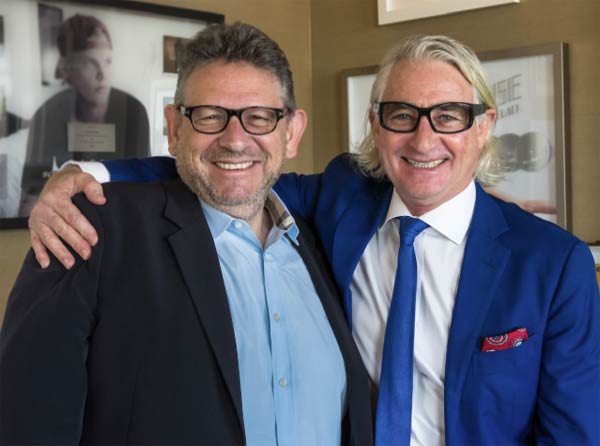
Chris Murphy and UMG CEO Sir Lucian Grainge
So when Lucian found out the deal hadn’t been done because of a slip-up in the system, he called me and he said I’m not going to let you go, I’m keeping you. And I said, well, it’s on one condition, I said you’ve got to buy half of my company. “Why?” I said because I need you and all your troops to be engaged in INXS.
I can’t run around the world by myself with a fucking little drum, banging it by myself, I want to do musicals, I want to do exhibitions, I want to do all these fancy-pants things; I want to do movies and documentaries, I didn’t come back just to, you know, sell a record. And he said “done”, and that’s how this whole thing came about.
And the great thing about it all is that over the last couple of years, you know, everyone’s, the main key people at Universal have probably thought what’s this fucking Murphy guy, this Australian guy, he’s fucking off the planet but they’ve all got to like me and respect me and my wacky ways.
If I had delivered the Mystify album three or four years ago, when I got the deal, I would have had business affairs and the legal department over me like a cheap suit. And they would not have allowed it.

SDE: What you’ve just said does explain why you reissued Kick again, because it was like pressing reset, in a way, wasn’t it, you doing that deal? And then it was like let’s start again – and that’s why the 2017 version of Kick happened, I guess. But Chris, let me ask you about the Max Q album? How come you didn’t get any music from that album into the Mystify soundtrack?
CM: It’s quite simple, the rights are in transit, okay. And that’s the only way I can express it, because people ask me these questions and I can’t answer them. They’re legal questions, they’re legal points that are going on behind the scenes. I would love to have released, on Petrol, Max Q, but the timing is not right.
SDE: So that will happen then at some point in the future?
CM: It has to happen, it has to happen.
SDE: Let’s talk about Giles Martin, because he has got this role of Executive Music Director, and he’s a very busy man, obviously, with his Beatles commitments. He’s just done the Elton John film, as you said. I think he’s got a role with SONOS as well, hasn’t he? So, how is that working out with Giles?
CM: Look, it’s bloody brilliant. Giles and I have a lot of fun together and we enjoy each other’s company. We take the piss out of each other all the time. Basically, what happened is that many, many years ago we got invited to Japan to do a festival and the Musical Director was Sir George Martin, who was one of my greatest heroes. Now, his son was on that trip, a young kid called Giles, and most of the people were just ignoring him, you know, just walking past him and going, “oh, hello, George Martin, how are you..”, you know, all that bullshit. But I’m a very different sort of character, everyone’s equal to me, it doesn’t matter who you are; if you have money, no money – it doesn’t matter who you are. So I saw that happening and said “hey Giles, how’s it going, buddy, good to see you”, and we made him feel welcome. So a couple of years later, we had a job to do – I can’t remember what the job was – and we gave it to Giles. So the history is simple, we gave Giles one of his first jobs.
SDE: And one of the things that’s good about Giles Martin is that he’s very much an advocate of 5.1, Dolby, Atmos and all that. Does that mean that future reissues are likely to follow the same format as the last Kick? Are we likely to see surround sound versions of some of the other albums?
CM: Look, I’d be a liar to say the word “yes, yes, yes” at this stage, because what I was going to say before you asked the question about the back catalogue, before February 2019, I probably spent the previous two years working on this INXS exhibition, the musical, and I was literally flying round the world, spending my own bloody money trying to get all these projects going, because I thought they were very important to the future. But in that time, I had left Petrol in the hands of Universal – it’s not a negative, it’s a fact.
And so, in February this year I thought to myself, I’d bloody better make sure my baby – Petrol is really my baby, one of my children – I’d better make sure all this is together. So we’re just finalising everything now and the problem was I was trying to push too many things. We’d got The Swing 35 [vinyl reissue] coming out, and that conflicted with this [Mystify] release date. So what we’re doing now is now that I’ve got Mystify out, because that was a very big mental and emotional obligation on my behalf, now we’ll sit back and have a look at The Other Side of INXS, Elegantly Wasted – which needs a whole new tune-up – Welcome to Wherever You Are… I was even thinking in the last couple of days, about the first two albums, INXS and Underneath the Colours. So there’s a lot of work to be done.
Thanks to Chris Murphy was talking to Paul Sinclair for SDE. ‘Live Baby Live’ is out today and ‘Mystify: A Musical Journey with Michael Hutchence’ is also available.
Compare prices and pre-order

INXS
Live Baby Live - 3LP vinyl

|
|
||||||||||||||||||||||||||||||||||||||||||||||||||||||||||||
Compare prices and pre-order

INXS
Live Baby Live - 2CD set

|
|
||||||||||||||||||||||||||||||||||||||||||||||||||||||||||||
Compare prices and pre-order

Michael Hutchence
Mystify - A Musical Journey With Michael Hutchence [VINYL]

|
|
||||||||||||||||||||||||||||||||||||||||||||||||||||||||||||
Compare prices and pre-order

Michael Hutchence
Mystify - A Musical Journey With Michael Hutchence

|
|
||||||||||||||||||||||||||||||||||||||||||||||||||||||||||||||||||
![]()
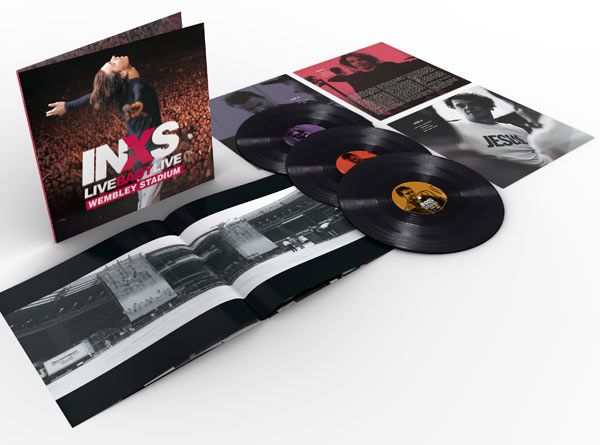
Live Baby Live: Wembley Stadium 3LP black vinyl
SIDE A
Guns in the Sky
New Sensation
I Send a Message
The Stairs
SIDE B
Know the Difference
Disappear
By My Side
Hear That Sound
SIDE C
Lately
The Loved One
Wild Life
SIDE D
Mystify
Bitter Tears
Suicide Blonde
What You Need
SIDE E
Kick
Need You Tonight
Mediate
SIDE F
Never Tear Us Apart
Who Pays the Price
Devil Inside
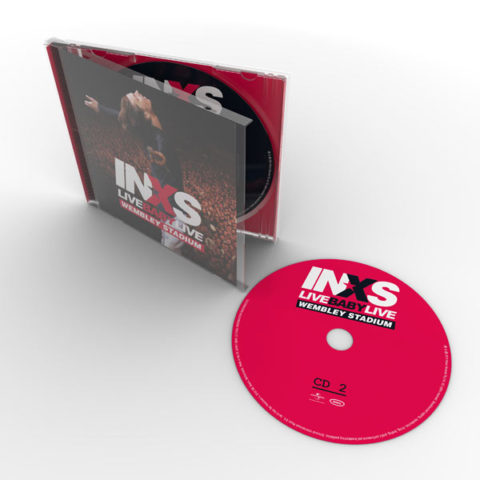
Live Baby Live: Wembley Stadium 2CD set
CD1
Guns in the Sky
New Sensation
I Send a Message
The Stairs
Know the Difference
Disappear
By My Side
Hear That Sound
Lately
The Loved One
Wild Life
CD2
Mystify
Bitter Tears
Suicide Blonde
What You Need
Kick
Need You Tonight
Mediate
Never Tear Us Apart
Who Pays the Price
Devil Inside
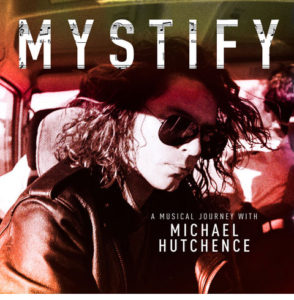
MYSTIFY – A MUSICAL JOURNEY WITH MICHAEL HUTCHENCE
SIDE A
Let It Ride • Deliver Me (Demo) • Black & White • Need You Tonight (Live 1988) • Under My Thumb** • Please (You Got That)
SIDE B
What You Need • Don’t Change • Spill The Wine* • Move On • Need You Tonight
SIDE C
Devil Inside • Love Is (What I Say) • Baby Don’t Cry • All I’m Saying* • Shine Like It Does
SIDE D
Burn For You • Viking Juice • Kiss The Dirt (Falling Down The Mountain) • Original Sin • Never Tear Us Apart***
* Michael Hutchence
** Michael Hutchence & London Symphony Orchestra
*** Michael Hutchence, Mylène Farmer & INXS

 Interview
Interview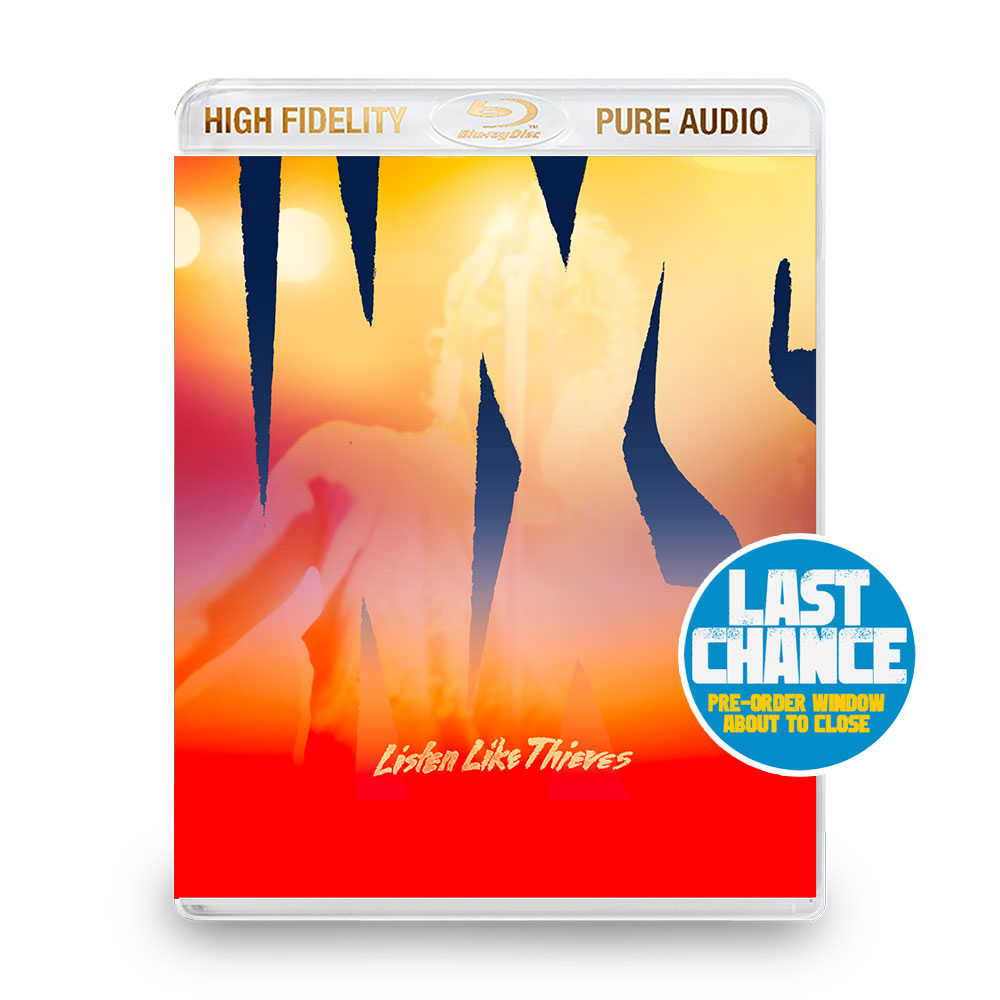
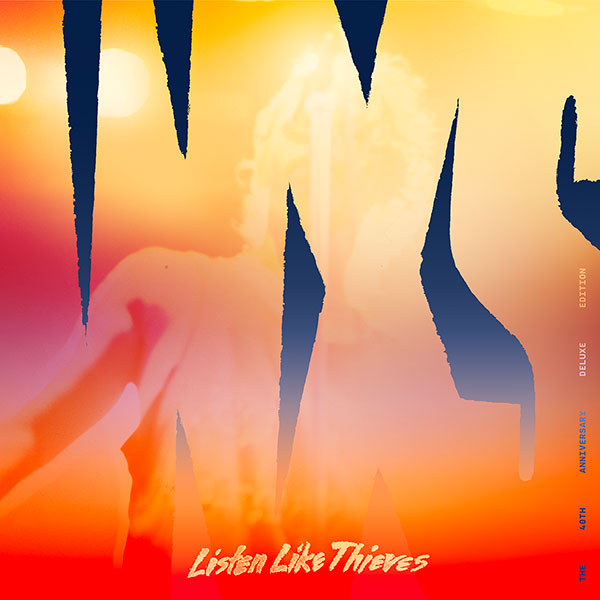

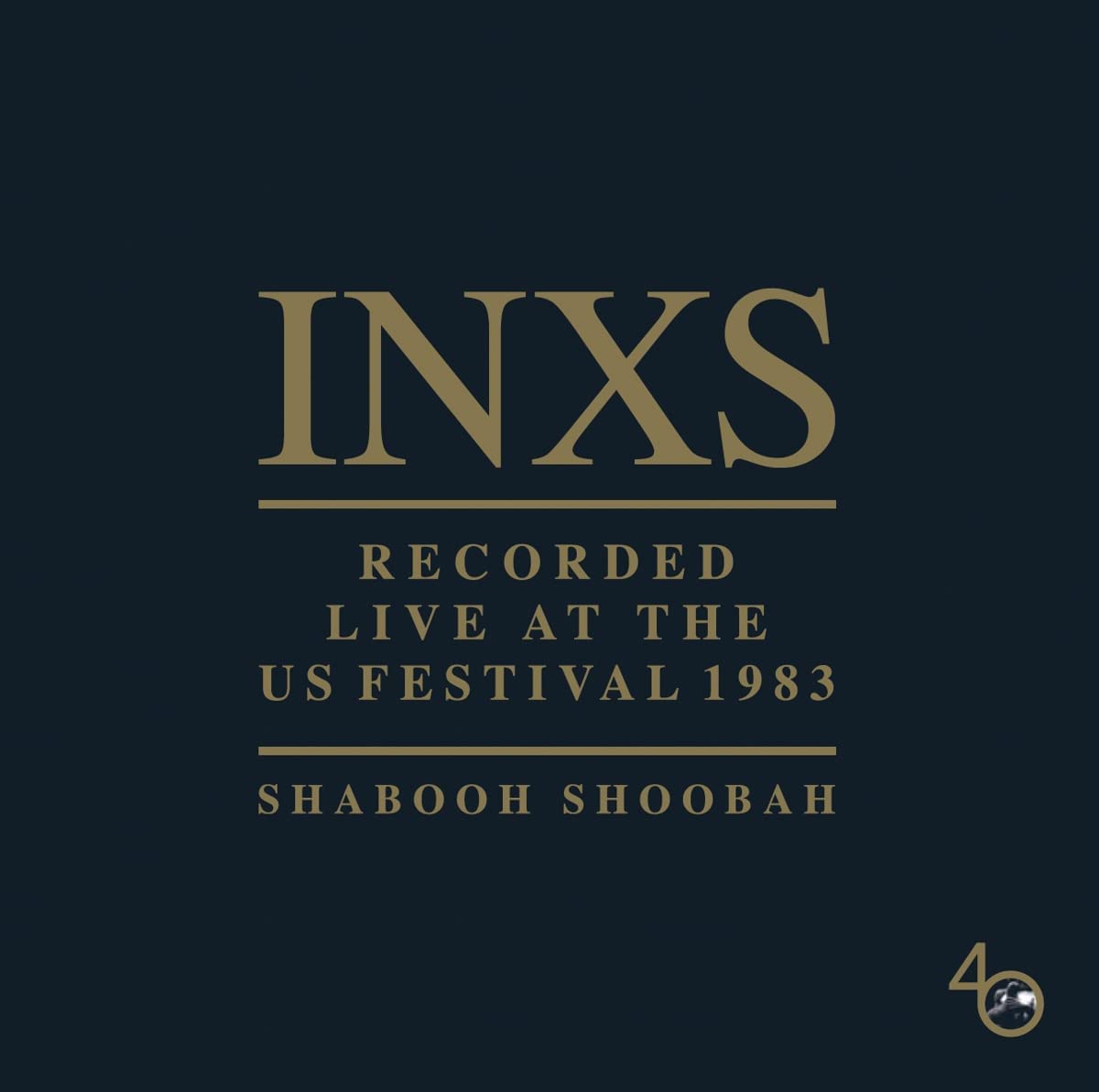
By Paul Sinclair
40